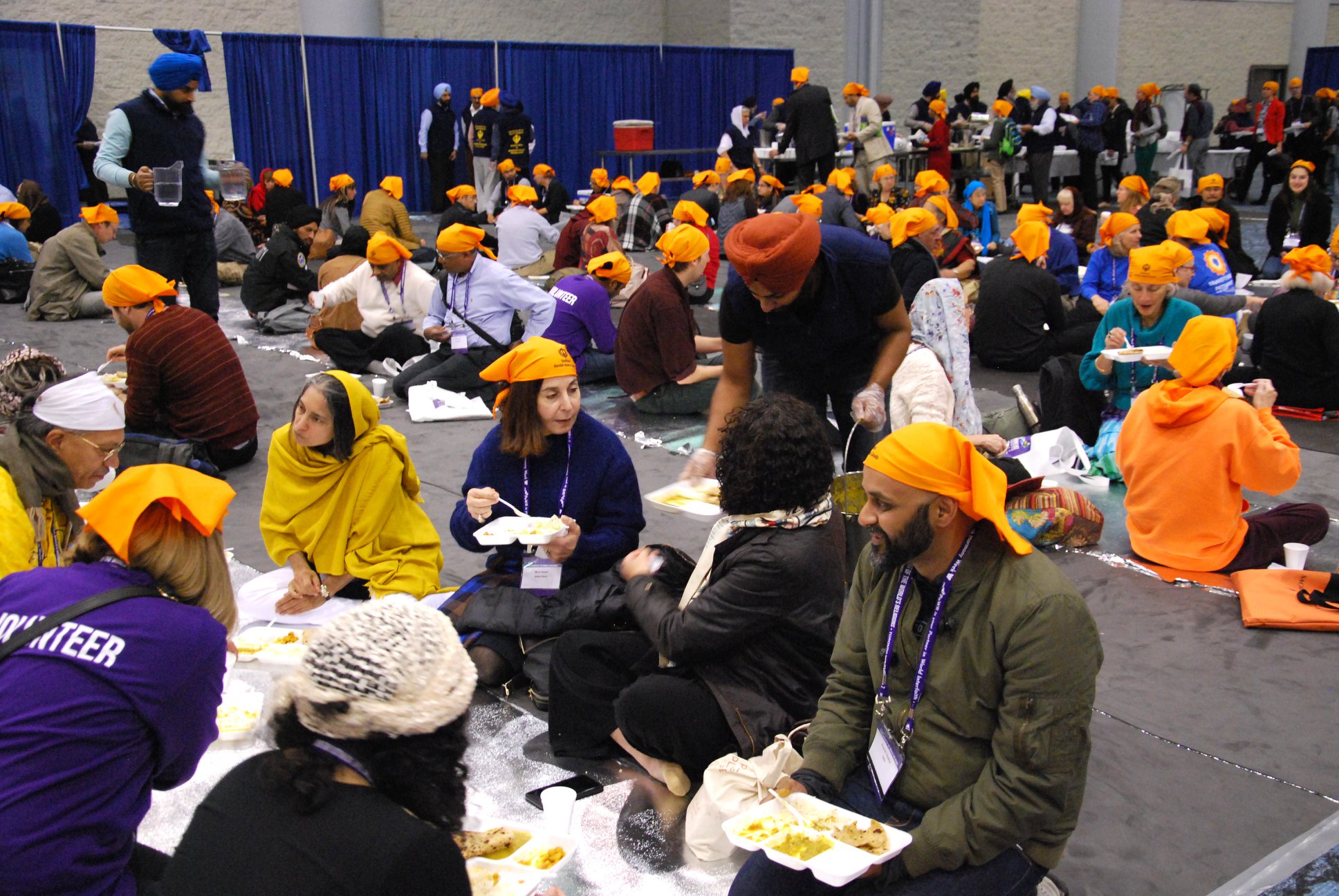Hari Nam Singh Khalsa sits me down and nimbly wraps the bright orange fabric of the turban around my head.
“Guru Gorbind Singh said we should crown ourselves” with the turban, Khalsa tells me as he works. “When I put the turban on it uplifts my spirit. It just gives me that sense of calmness.”
Khalsa, a spiritual leader, is one of many representatives of the Sikh faith at the Parliament of the World’s Religions, the largest interfaith gathering in the world, which wraps up Nov. 7 in Toronto. This is the first time the event has ever been held in Canada.
My head feels snug and comfortable with the turban wrapped around it, but I take it off nonetheless as I leave Khalsa’s booth, feeling a little shy. I am in the family section of the Parliament, and this turban tying activity is intended for children, but I feel like a child myself among the world religions present here, ignorant as I am of so many of them.
For one week, thousands of faithful people from all over the world have gathered at the Metro Toronto Convention Centre to learn from one another, worship together, and celebrate their shared relationship with the sacred. They represent dozens of different faith and spiritual traditions, and the convention centre looks kaleidoscopic as adherents shuffle between workshops, lectures and other sessions wearing a diverse array of religious garments.
In the wake of the mass shooting at the Tree of Life synagogue in Pittsburgh and the brazen hatred which that shooting exemplified, the Parliament feels like a necessary antidote, even if the attendees are all predisposed to interfaith dialogue. Those who most need to learn to welcome the other aren’t present this week.
The conference’s overarching focus has been on mobilizing religious faith to effect progressive change. Discussions on how the world’s faiths can respond to challenges like climate change, intolerance, reconciliation and women’s empowerment are just some of the topics covered.

At one session, Linda Jo Doctor from the W.K. Kellogg Foundation and Oran Hesterman of the Fair Food Network lead me through how their Jewish faith motivates the food justice organizing they do in America. Oran blesses some challah bread he had baked earlier, and explains how he and other Jews are reformulating the definition of kosher food to include ecological sustainability in the concept.
While the Parliament has attracted some of the biggest luminaries in today’s religious landscape as keynote speakers, it is the more intimate encounters like Oran’s challah blessing and the lesser-known presenters and guests I meet that move and teach me the most.
Katie Jo Suddaby, a pastor in the American Baptist Churches USA, speaks to me about the practice of Buddhist sand painting, which she has been pursuing for almost a decade. “Even though we’re told [in Christianity] to meditate, there’s not a lot of practical teaching on how to do it,” Suddaby tells me while she patiently spreads coloured sand across a table in front of her. “But the Buddhists have plenty of practical teaching,” she says, and sand painting, where you “clear your mind and meditate on the image you’re making” is a practice that has enthralled Suddaby.
Like the sand painter, many here are open to experiencing and even participating in new religious practices. I sit in a conference room with a handful of others and watch the ritual chants of the Hindu puja unfold. “Don’t tell Jesus,” one Christian jokes to another as they watch a Hindu worshipper offer praise to divinities with candles and delicate flowers.
Kirk Dunn, also known as the Knitting Pilgrim, gives a talk in which he shares the incredible story of how he spent 15 years knitting a triptych of tapestries depicting the three Abrahamic faiths, and the interfaith dialogue that his project has inspired.
Whether they are invited presenters or paying guests, everyone gathered here is generous with their stories and traditions, and with their time. Perhaps that is nowhere as evident as at lunch time each day, when the Toronto Sikh community provides Parliament attendees with a a free langar meal. A langar, I learn, is a Sikh community kitchen where free meals are provided to anyone who wants one. The meals are simple and vegetarian and are taken sitting down, all to emphasize the equality of those partaking in the meal.

“The langar is offered by the Sikh community in the spirit of sharing but not charity. Charity assumes inequity of status but in sharing we are all equal,” says Tarunjit Butalia, Trustee of the Sikh Council for Interfaith Relations.
Surrinder Singh Sahota, who attends the gurdwara in Scarborough, is in charge of the first langar lunch. “We want to show the world what Sikhism is all about,” he tells me, taking a break from preparing the meal, which is made up of rice, dal and chapatis, and which is eaten graciously by thousands.
After a busy morning, the lunch refreshes me. I return back into the crowd, which is made up of thousands of monks, rabbis, imams, priests, elders and more (not to mention those who are simply spiritually curious). Together, these people are an embodiment of the hope that interfaith collaboration is not only possible, but a powerful force capable of reshaping the world.
As I leave the Parliament, however, I can’t help but think of the limitations of the event. The majority of the people I have met this week are liberal Americans, curious to learn about faiths other than their own. Everyone I meet speaks English, and attendees must all have access to the funds necessary for travel, hotel rooms, and the $450 entry fee to the Parliament.
While a global gathering like this may enlighten those who are able to attend, I hope Parliament-goers put into practice whatever they’ve learned here in the communities they are returning to. To be truly transformative, interfaith dialogue needs to be carried out in local communities, not grand international gatherings which are far from home.















